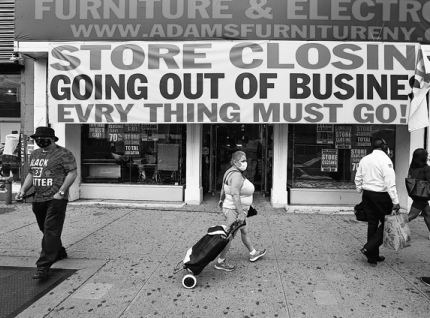Death knell sounded for small firms in New York

Nearly 3,000 small businesses in New York City have been forced to close due to the economic toll stemming from the novel coronavirus pandemic, the largest number in any US city.
Since March 1, at least 2,800 small businesses have closed according to Yelp, the business review website, and business experts believe that the actual number could be higher.
The closings started when New York Governor Andrew Cuomo ordered a lockdown in March to contain the spread of the virus.
New York's distinct neighborhoods are home to many small businesses, from one-of-a-kind coffeehouses and mom-and-pop dry cleaners to family-owned hardware stores and ethnic restaurants. Each gives its area a distinctive identity, often representing the culture of people who have historically lived there.
Bali Kitchen, an Indonesian restaurant in the East Village, closed on Aug 1 but will still serve food until Aug 25. "Unfortunately, we have been forced to close due to the pandemic," the restaurant said on its website.
In New York City, about 10,500 businesses are owned by an ethnic minority or women, according to The New York Times. But many of those businesses suffered when they had to close temporarily at the height of the pandemic. However, some have since rebounded by offering takeout, delivery and curbside dining.
John C. Liu, a New York state senator representing northeast Queens, said: "COVID-19 had started to decimate commercial activity and business in Asian communities long before it started hitting the rest of the economy.
"As early as January, businesses were seeing tremendous declines in their activity, and many restaurants started shutting down as early as January in what is usually a season between the calendar New Year and the Lunar New Year and the weeks following the new year that is usually the high season for a great deal of business activity in the Chinese community and broader Asian community," said Liu, a Democrat."If you talk about what has affected the Asian community, that has been felt very deeply."
In July, New York Mayor Bill de Blasio signed an executive order to strengthen the city's utilization of minority and female-owned businesses.
City agencies pledged to obtain goods, services and construction services from such businesses for contracts valued up to $500,000.
"Our city works best when everyone-regardless of race, gender or ethnicity-has the resources they need to participate in our economy," he said."With these programs, we're bringing business opportunities directly to diverse and talented New Yorkers who provide our city with a variety of goods and services."
Pandemic fallout
Thousands of restaurants in the city have been battered by the pandemic fallout, despite a phased reopening since July that added outdoor dining and curbside delivery.
More than 80 percent of the restaurants and bars did not pay their full rent in June, according to the NYC Hospitality Alliance, forcing the industry to work with officials to find solutions.
"For many restaurateurs, it is a steep hill to climb, but elected officials understand this, and we're hopeful that they will enact policies to ease the burdens facing the industry," Melissa Fleischut, president and CEO of the New York State Restaurant Association, said.
Data from the Partnership for New York City, an influential business group, suggested that about a third of the city's 240,000 small businesses, those with 500 employees or fewer, could eventually close by the time the pandemic ended.
This would be a huge blow to the sector as it represents a large percentage of the city's employers and provides 3 million jobs, 520,000 of which have already been shed, according to the group.
Nationwide, small businesses are also hemorrhaging. Figures from Yelp show that of the 80,000 shops that have permanently shut from March 1 to July 25, at least 60,000 of them were local businesses. And 800 small businesses filed for Chapter 11 bankruptcy from mid-February to July 31, according to the American Bankruptcy Institute.

Today's Top News
- China's industrial profits down 1.8% in H1
- Thailand responds to Trump's ceasefire call
- Recall vote shows DPP's manipulation runs against Taiwan people's will: mainland spokesperson
- Top DPRK leader visits China-DPRK Friendship Tower
- China proposes global cooperation body on AI
- Scholars propose inclusive human rights framework






























